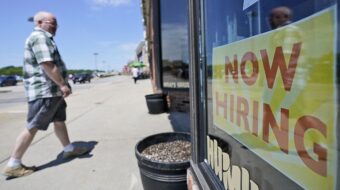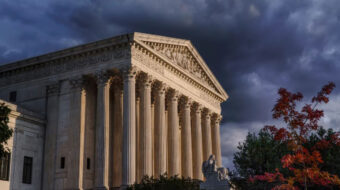The final report of the bipartisan national 9/11 commission is unlikely to stamp out questions about the Bush administration’s handling of the Sept. 11, 2001, terrorist attacks, its Iraq war, or its overall foreign policy.
Rather than folding up shop after issuing their report, allowing these issues to fade from the public’s eye, as Bush may have hoped, commission members announced they would spend the summer lobbying for their recommendations. Senate hearings are in the works.
Republicans clearly hope to pin the blame for the administration’s 9/11 and Iraq failures on “faulty intelligence,” and divert attention to the commission’s recommendations for restructuring the intelligence agencies. But those proposals themselves raise troubling questions. And the report, cautious as it is, raises other issues that can cause problems for the Bush administration as it heads into the heat of the presidential election campaign.
The report calls for establishment of a cabinet-level national intelligence director (NID), located in the office of the president, who would oversee the CIA, FBI and all other intelligence bodies. In addition, the report proposes creation of a National Counterterrorism Center (NCTC), also in the president’s office, which would direct intelligence gathering and operations both inside and outside the U.S.
Investigative reporter Robert Dreyfuss calls these “Big-Brother-like” measures. He points out that “the NCTC-NID combination would concentrate the power to carry out domestic spying in an all-powerful nexus, located where? In the White House.”
Warning against blurring the lines between domestic and foreign intelligence, the American Civil Liberties Union said bringing “the CIA’s culture of covert, subversive operations” into the domestic arena would mean “a further weakening of civil liberties protections.”
The Bush administration’s manipulation of intelligence to sell the Iraq war has sparked concerns about separating intelligence gathering from political pressure. But these proposals go in the opposite direction. An “intelligence director sitting in the White House would be in the hip pocket of the president,” ACLU Executive Director Anthony Romero said.
More profoundly, former Clinton Labor Secretary Robert Reich comments, “Let’s not fool ourselves into thinking that better intelligence is a substitute for better policy.”
In a slap at the Bush administration’s unilateralist militarism, and indirectly suggesting that the U.S. invasion of Iraq has damaged efforts to curb terrorism, the commission calls for a “balanced” preventative strategy “that is as much, or more, political as it is military.” Further, the report says the U.S. “should offer an example of moral leadership … committed to treat people humanely [and] abide by the rule of law.”
Although Dick Cheney continues to claim otherwise, the commission also reaffirms its conclusion that there is no evidence of collaboration between Saddam Hussein and al Qaeda.
In a section given scant attention by the commercial media, the report traces the emergence of Bin Laden and al Qaeda to the U.S.-sponsored war that ousted the Soviet-backed secular/democratic Afghan government in 1988. The report says that war “gave Islamist extremists a rallying point and training field.” Bin Laden, with access to his family’s huge fortune, became known “as a person who generously helped fund the anti-Soviet jihad,” the report says.
“Bin Ladin understood … the extent to which the continuation and eventual success of the jihad in Afghanistan depended on an increasingly complex, almost worldwide organization,” the report continues. He and associates “established what they called a base or foundation (al Qaeda) as a potential general headquarters” for this. “The international environment for Bin Ladin’s efforts was ideal. Saudi Arabia and the United States supplied billions of dollars worth of secret assistance to rebel groups in Afghanistan fighting the Soviet occupation.”
The report claims that Bin Ladin and associates received “little or no” assistance from the U.S. “because they had their own sources of support.” But the point is clear: the roots of al Qaeda lie in the U.S. government’s covert anti-Soviet “jihad.”
Despite efforts to spread blame equally between the Clinton and Bush administrations, the report paints a harsh picture of Bush’s lack of interest in the flood of attack warnings in the summer of 2001.
“Most of the intelligence community recognized … that the number and severity of threat reports were unprecedented. Many officials told us that they knew something terrible was planned, and they were desperate to stop it,” the commission says.
A briefing Bush received on Aug. 6, 2001, titled “Bin Ladin Determined to Strike U.S.,” referred to “patterns of suspicious activity in this country consistent with preparations for hijackings or other types of attacks, including recent surveillance of federal buildings in New York.” It mentioned a call received in May by the U.S. Embassy in the United Arab Emirates “saying that a group of Bin Ladin supporters was in the U.S. planning attacks with explosives.”
The 9/11 report says Bush “did not recall discussing the Aug. 6 report with the Attorney General or whether Rice had done so.” The commission “found no indication of any further discussion before September 11 among the President and his top advisers of the possibility of a threat of an al Qaeda attack in the United States.”
The author can be reached at suewebb @ pww.org.












Comments